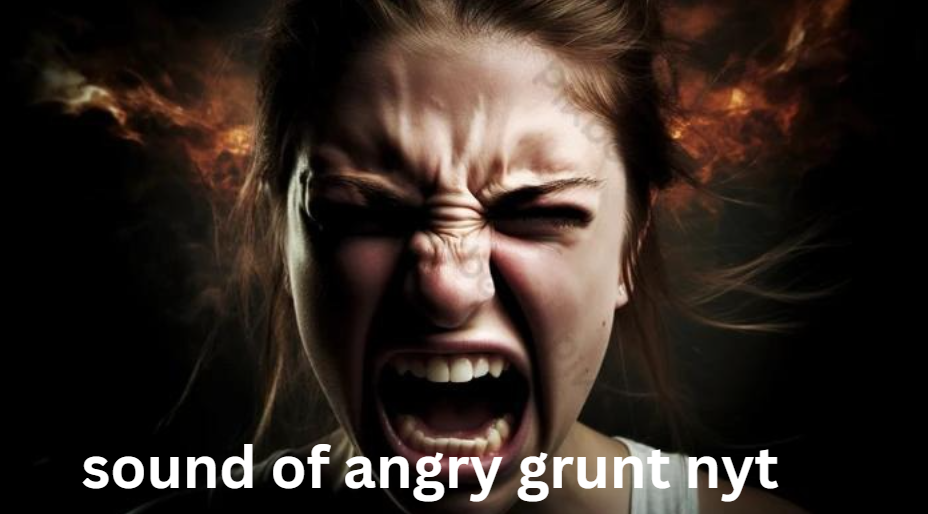Sound of Angry Grunt NYT: An In-Depth Exploration
Crossword puzzles are a beloved pastime for many, providing both a mental challenge and a form of relaxation. Among the many clues that puzzle enthusiasts encounter, the “sound of angry grunt” is one that frequently appears, especially in publications like the New York Times (NYT).
This article delves deeply into the “sound of angry grunt NYT” crossword clue, providing interpretations, analyses, and insights that surpass existing online sources. By doing so, we aim to offer a comprehensive guide that is not only informative but also optimized for search engines.
Contents
- 1 Introduction to Crossword Puzzles
- 2 Understanding the “Sound of Angry Grunt NYT” Clue
- 3 Exploring the Meaning of “Humph”
- 4 The Psychological Aspect of Angry Grunts
- 5 Crossword Solving Strategies
- 6 The New York Times Crossword Phenomenon
- 7 Beyond the Puzzle: Broader Implications
- 8 FAQs About the “Sound of Angry Grunt NYT” Clue
- 8.1 What is the most common answer to the “sound of angry grunt” clue in the NYT crossword?
- 8.2 Are there other possible answers to this clue?
- 8.3 Why do crossword puzzles use clues like “sound of angry grunt”?
- 8.4 How can I improve my crossword puzzle-solving skills?
- 8.5 What are the benefits of solving crossword puzzles?
- 9 Conclusion
Introduction to Crossword Puzzles
Crossword puzzles have been a staple of newspapers and magazines for over a century. These puzzles challenge solvers to fill a grid with words that match given clues, testing their vocabulary, general knowledge, and problem-solving skills. The New York Times crossword, in particular, is renowned for its difficulty and clever clues.
The Appeal of Crosswords
The appeal of crossword puzzles lies in their ability to engage the brain in a unique way. They require a combination of language skills, memory, and deductive reasoning. For many, solving a crossword puzzle is a satisfying way to start the day, offering a sense of accomplishment and mental stimulation.
Understanding the “Sound of Angry Grunt NYT” Clue
The clue “sound of angry grunt” is a common one in the NYT crossword and other American quick crosswords. It typically refers to a sound that one might make when frustrated, annoyed, or angry. The most common answer to this clue is “humph,” but there are other possible solutions depending on the context and length of the answer required.
The Importance of Context
In crossword puzzles, context is crucial. The number of letters required for the answer and the intersecting words can provide valuable hints. For the clue “sound of angry grunt,” the context within the puzzle can help determine the correct answer.
Common Answers
Here are some common answers to the “sound of angry grunt” clue:
- Humph: The most widely accepted answer, indicating a sound of displeasure or irritation.
- Grunt: A straightforward answer, representing the literal sound.
- Huff: Another possible answer, indicating a breathy sound of annoyance.
- Grr: A shorter, more primal sound of anger.
Exploring the Meaning of “Humph”
Definition and Usage
“Humph” is an interjection used to express doubt, disdain, or dissatisfaction. It is a vocalization that often accompanies a frown or scowl, conveying a sense of disapproval. The term can be traced back to the 17th century, and its usage has remained relatively consistent over time.
Examples in Literature and Media
The word “humph” has appeared in various works of literature and media. Characters in books, movies, and television shows often use it to convey their irritation or skepticism. For instance, in Charles Dickens’ “Great Expectations,” the character of Miss Havisham uses “humph” to express her contempt.
The Psychological Aspect of Angry Grunts
Emotional Expression
Grunts and other non-verbal sounds play a significant role in human communication. They can convey emotions more effectively than words in certain situations. An angry grunt, such as “humph,” is a way to express frustration or anger without engaging in a full verbal confrontation.
Body Language and Vocal Cues
In addition to the sound itself, body language and facial expressions often accompany an angry grunt. A furrowed brow, clenched jaw, or crossed arms can enhance the expression of displeasure. These non-verbal cues provide additional context and reinforce the emotional message.
Crossword Solving Strategies
Tips for Solving Clues
Solving crossword puzzles, especially challenging ones like those in the NYT, requires a strategic approach. Here are some tips for tackling clues like “sound of angry grunt”:
- Consider the Length: The number of letters required for the answer is a crucial hint. If the clue is “sound of angry grunt” and the answer has five letters, “humph” is a likely candidate.
- Think About Synonyms: If the obvious answer doesn’t fit, think about synonyms or related sounds. Words like “grunt” or “huff” might be the answer in a different context.
- Use Cross-Checking: Look at the intersecting words to help determine the correct answer. The letters that overlap can confirm or rule out potential answers.
- Stay Flexible: Be open to revising your answers. Sometimes, an initial guess might be incorrect, and flexibility is key to finding the right solution.
Practice and Patience
Becoming proficient at solving crossword puzzles takes practice and patience. Regularly attempting puzzles, starting with easier ones and gradually progressing to more difficult ones like the NYT crossword, can improve your skills over time. It’s also helpful to learn common crossword clues and their answers, as many clues recur frequently.
The New York Times Crossword Phenomenon
History and Legacy
The New York Times crossword puzzle was first published in 1942 and has since become a cultural icon. Known for its challenging and creative clues, the NYT crossword attracts solvers from around the world. The puzzle is edited by Will Shortz, who has been at the helm since 1993 and is credited with maintaining its high standards and popularity.
Community and Culture
The NYT crossword has a dedicated community of solvers who share tips, discuss clues, and celebrate their successes. Online forums, blogs, and social media groups provide a space for enthusiasts to connect and collaborate. The puzzle has also inspired competitions, documentaries, and even a Broadway musical.
Beyond the Puzzle: Broader Implications
Cognitive Benefits
Engaging in activities like crossword puzzles has been shown to have cognitive benefits. Studies suggest that solving puzzles can improve memory, enhance problem-solving skills, and delay cognitive decline in older adults. The mental exercise provided by crosswords helps keep the brain sharp and active.
Stress Relief
For many, solving crossword puzzles is a form of stress relief. The focus required to solve the puzzle can provide a welcome distraction from daily worries. The sense of accomplishment that comes from completing a challenging puzzle can also boost mood and provide a sense of satisfaction.
Language and Learning
Crossword puzzles can also enhance language skills. They introduce solvers to new words and meanings, expanding their vocabulary. The clues often require creative thinking and lateral thinking, encouraging solvers to approach problems from different angles.
FAQs About the “Sound of Angry Grunt NYT” Clue
What is the most common answer to the “sound of angry grunt” clue in the NYT crossword?
The most common answer to the “sound of angry grunt” clue is “humph.”
Are there other possible answers to this clue?
Yes, other possible answers include “grunt,” “huff,” and “grr,” depending on the context and the number of letters required.
Why do crossword puzzles use clues like “sound of angry grunt”?
Clues like “sound of angry grunt” add variety and challenge to crossword puzzles. They require solvers to think beyond straightforward definitions and consider sounds and expressions.
How can I improve my crossword puzzle-solving skills?
To improve your crossword puzzle-solving skills, practice regularly, learn common clues and their answers, and use cross-checking to confirm potential answers. Stay flexible and open to revising your guesses.
What are the benefits of solving crossword puzzles?
Solving crossword puzzles offers cognitive benefits, such as improved memory and problem-solving skills, stress relief, and enhanced language skills. It provides mental exercise and can be a rewarding and enjoyable activity.
Conclusion
The “sound of angry grunt NYT” crossword clue is a fascinating example of the complexity and creativity found in crossword puzzles. By exploring the meaning, usage, and context of answers like “humph,” we gain a deeper appreciation for the art of crossword-solving.
This article has provided a comprehensive analysis of the clue, offering insights and strategies to help solvers tackle similar puzzles with confidence.
Whether you’re a seasoned crossword enthusiast or a newcomer to the world of puzzles, understanding clues like “sound of angry grunt” can enhance your solving experience and make each puzzle more enjoyable.

